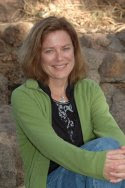 Someone asked me while I was traveling in Antarctica, “So...are you having the greatest time ever?”
Someone asked me while I was traveling in Antarctica, “So...are you having the greatest time ever?”Of course I said yes, and I was having a great time—beauty, adventure, and purpose all rolled into one delightful trip. But as time went on a part of me shattered into a million tiny pieces every time the glacier sprayed ice into the harbor or an elephant seal scream or a whale breeched earth and sky. In the groaning of the glacier, in the eye of the whale—I sensed something precious slipping away. Like a loved one you want to call home, but wait too long and when you speak, she is too far away to hear you.
One scientist said, “The question is not whether the earth will survive.” He paused and looked into my eyes. “The question is,” he said, “have we humans overplayed our hand?” When I think of acceptance, compassion, and hope all bundled up into one, I will forever see his brilliant blue eyes.
Antarctica is big—vast spaces covered in white. White is an expansive color, so the emptiness grows out of proportion even to itself. We haven’t colonized the place to any grand degree, and much of life in Antarctica goes on under the sea.
From the top of Pikes Peak in Colorado, on a clear day you can see for miles. If you look at the surface of the ocean—which can plunge down for miles before water meets earth—you might see a few hundred feet on a clear day. The deepest I saw (I know because we were measuring turbidity) was 65 feet. I felt so small. Small and helpless.
I am one person living in a world occupied by billions. Even if I went to bed at dusk and got up with sun, eliminated plastic from my life, stopped using gasoline, turned down the heat and shivered all winter, nothing would change. If I could do everything—and I know I can’t—what difference would it make?
 A friend helped me to see that everything hangs in the balance of one billion divided by one. It’s not one person doing one billion things—that’s impossible, almost comical to imagine. But one billion people making one small change gives me shivers.
A friend helped me to see that everything hangs in the balance of one billion divided by one. It’s not one person doing one billion things—that’s impossible, almost comical to imagine. But one billion people making one small change gives me shivers.Why does that seem so much more possible? I think—I hope—it’s because I know I can do one thing, and my friends can do one thing, and their friends can do one thing. Try and think of one person you know who can’t do one small thing to help. Try and think of one person who wouldn’t help in some small way, if they could, if it was barely noticeable in the everyday motions of life. I can’t think of anyone like that.






